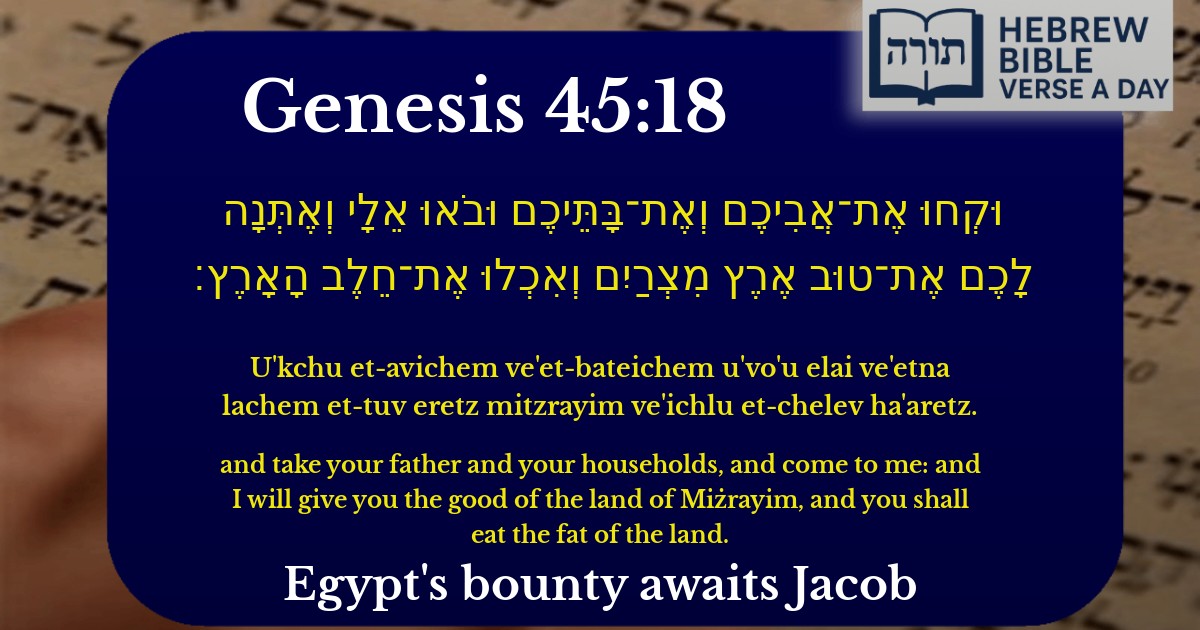Join Our Newsletter To Be Informed When New Videos Are Posted
Join the thousands of fellow Studends who rely on our videos to learn how to read the bible in Hebrew for free!
Hebrew Text
וּקְחוּ אֶת־אֲבִיכֶם וְאֶת־בָּתֵּיכֶם וּבֹאוּ אֵלָי וְאֶתְּנָה לָכֶם אֶת־טוּב אֶרֶץ מִצְרַיִם וְאִכְלוּ אֶת־חֵלֶב הָאָרֶץ׃
English Translation
and take your father and your households, and come to me: and I will give you the good of the land of Miżrayim, and you shall eat the fat of the land.
Transliteration
U'kchu et-avichem ve'et-bateichem u'vo'u elai ve'etna lachem et-tuv eretz mitzrayim ve'ichlu et-chelev ha'aretz.
Hebrew Leining Text
וּקְח֧וּ אֶת־אֲבִיכֶ֛ם וְאֶת־בָּתֵּיכֶ֖ם וּבֹ֣אוּ אֵלָ֑י וְאֶתְּנָ֣ה לָכֶ֗ם אֶת־טוּב֙ אֶ֣רֶץ מִצְרַ֔יִם וְאִכְל֖וּ אֶת־חֵ֥לֶב הָאָֽרֶץ׃
וּקְח֧וּ אֶת־אֲבִיכֶ֛ם וְאֶת־בָּתֵּיכֶ֖ם וּבֹ֣אוּ אֵלָ֑י וְאֶתְּנָ֣ה לָכֶ֗ם אֶת־טוּב֙ אֶ֣רֶץ מִצְרַ֔יִם וְאִכְל֖וּ אֶת־חֵ֥לֶב הָאָֽרֶץ׃
🎵 Listen to leining
Parasha Commentary
📚 Talmud Citations
This verse is not quoted in the Talmud.


Context of the Verse
This verse (Bereshit 45:18) is part of Pharaoh's invitation to Yosef's family to settle in Mitzrayim (Egypt) during the years of famine. Yosef had revealed his identity to his brothers and instructed them to bring their father Yaakov and their households to Egypt, where they would be sustained.
Pharaoh's Generosity
Rashi explains that Pharaoh's offer, "I will give you the good of the land of Mitzrayim," refers to the fertile region of Goshen (ארץ גושן), which was the choicest part of Egypt. The phrase "fat of the land" (חלב הארץ) symbolizes abundance and the finest produce, as noted by Ramban, who connects it to the richness of the soil and its agricultural yield.
Spiritual Implications
The Midrash (Bereshit Rabbah 95:1) highlights that this invitation was divinely orchestrated to fulfill the prophecy given to Avraham (Bereshit 15:13) about his descendants dwelling in a foreign land. The "good of the land" was not merely material but also a means to preserve Bnei Yisrael during the famine, ensuring the continuity of the future nation.
Yaakov's Reluctance
Despite Pharaoh's generous offer, Chazal (Tanchuma, Vayigash 5) teach that Yaakov hesitated to descend to Egypt until receiving divine assurance (Bereshit 46:3-4). This reflects the tension between physical sustenance and spiritual concerns, as Egypt was a morally corrupt land. The "fat of the land" thus also alludes to temporary material comfort before the eventual redemption.
Halachic Perspective